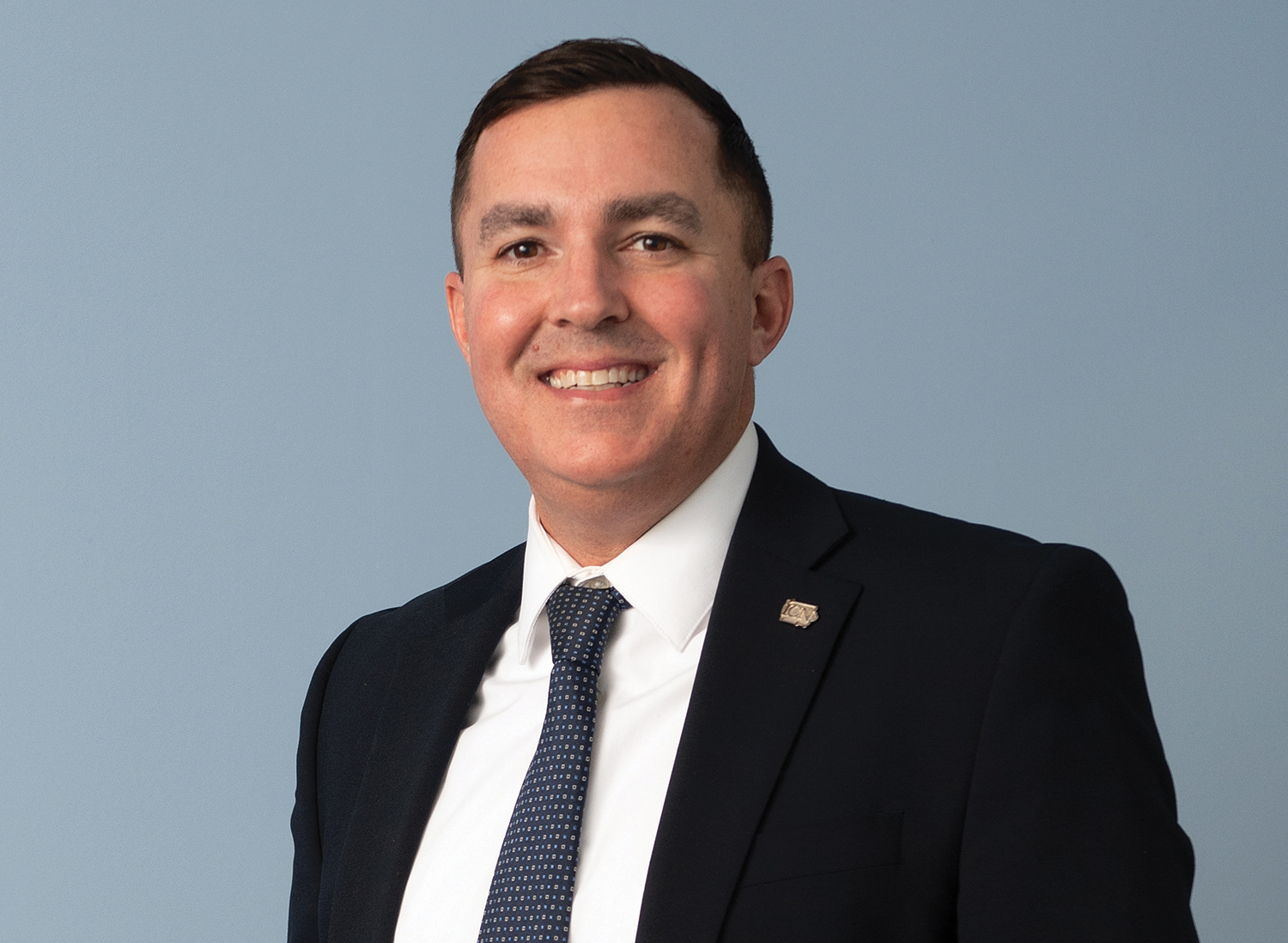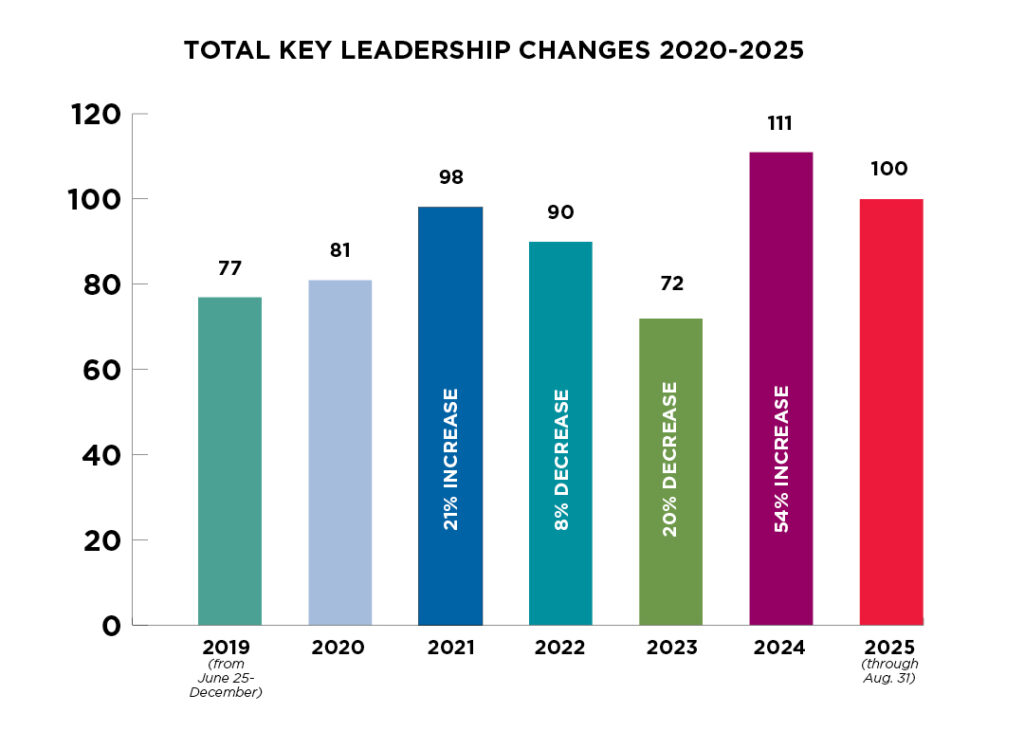A Closer Look: Ryan Mulhall
Executive director, Iowa Communications Network

Lisa Rossi Dec 20, 2024 | 6:00 am
9 min read time
2,183 wordsA Closer Look, Business Record Insider, Government Policy and Law, Innovation and EntrepreneurshipRyan Mulhall believes in learning by doing.
That was his experience in the military on the officer side when his first job was to be in charge of the communications — both the IT and enterprise and the wide-area network for half the country of Afghanistan — for an estimated 35,000 users.
“There’s nowhere else you’ll get that experience as basically an entry-level, first-time job,” said Mulhall, who stepped into the role of executive director of the Iowa Communications Network (ICN) on Aug. 30. “The scale and scope of that was definitely way more than I could handle at the time, but that’s how you learn by doing. You quickly learn who you can rely on and count on, how to prioritize what’s important, how to communicate complex technical things to audiences that aren’t technical, and just doing it that way. Sink or swim, right?”
Mulhall became executive director of the ICN, the state agency that provides telecommunications services to Iowa education, government, health care and public safety entities, after serving as the network’s chief information officer for eight years. Before joining ICN, he led communications for the United States Army in Afghanistan and on military bases in the U.S. and worked for IP Pathways in Urbandale, specializing in IT infrastructure projects.
The Business Record caught up with Mulhall recently to learn more about him and his philosophy for leading the agency that administers Iowa’s statewide fiber optic telecommunications network.
This Q&A has been lightly edited for clarity and brevity.
What was your reaction when you found out you were appointed executive director?
Yeah, you never know. It’s obviously relationships. There’s still an application process, going through interviews with stakeholders and ultimately, I had a couple days notice. You just put your best foot forward and share your plan and what you want to work on and some of the things you need to change. Some ideas were ready-made to start going after.
I’d love to hear about those.
I would say the big things we’re looking at is to run more like a business. We used to get money for operations and some of our infrastructure stuff, and the last 10 years, we’ve kind of shifted away from that. We still have some of that traditional state agency mindset, the way we’ve always done it, or we don’t need to be more efficient. It’s trying to drive more of that private business mentality of generating revenue, profitability and look at the big things, from opportunities to provide new services to customers as well as some of the expenses. We do have a tendency to hold on to some of our legacy infrastructure as well. Right now, we’re looking at getting out of the traditional legacy voice or copper infrastructure, which the telecommunications industry has been on that path for awhile. We need to accelerate that a little bit and get completely off the old legacy systems.
I saw ICN is looking to invest more in the private sector. Can you walk me through what that would look like?
We run a middle-mile fiber network across 99 counties. We run and operate a backbone and make sure our customers can get their location to another location and out to the internet. Those last-mile connections to our end-user connections, we have to basically get those connections from the private sector. We’re pretty limited in scope and scale. We can’t do private businesses, we can’t do residentials, we can only do education, health care, state and federal government and public safety entities. But the new services, that’s where we’re looking for the public-private partnership as well as how we can save money, operate better, more efficiently, whether that’s through consulting, having the private sector come in and do some of those functions for us, as well as replace those communications.
The ICN was started as a fiber network that was put in as a way to connect rural education facilities, K-12 as well as the community colleges, so they could have distance learning as well as two-way video so they could share resources, take classes. The technology has evolved and we sunset our video platform service. We held on to it longer than we should. You have Zoom, Teams, Google Meet, Cisco Webex. Looking to those, how we can partner with those companies to provide services on a scale. The buying power that we can provide statewide to help provide those services cost effectively as well as make a little bit of money to continue our operations, but not break our customers’ banks — those are the kinds of partnerships that we’re looking for. As we are starting to sunset our voice services, we have a managed partnership with Lumen running a Voice over Internet Protocol service, and we have a partnership with Zoom. We are an authorized reseller of Zoom, Zoom phones, the video piece, the phone piece, just trying to stay with the industry the way things are going.
So, do schools and your clients pay you to use Zoom?
Yes, they procure it through us.
And you provide the fiber optic network that allows Zoom to operate?
Yes. We provide the internet service, the ethernet service, the communication service, and we layer other services on top of that that would make it a value add for continuing to utilize our connections.
How is that going, are a lot of your clients using Zoom?
I would say yes. Between Google, Microsoft Teams and Zoom, I would guess it’s a big business, and I would say Zoom phone, they are a new player to it, but they’re starting to get a whole lot of market penetration, just for the simplicity of getting the basics of what customers need for that unified communications. So yes, it’s growing.
How are you combating the digital-urban divide when it comes to internet access?
The ICN has always played a big role in that. We have presence in all 99 counties, to the schools, hospitals and clinics. Those are community anchor institutions you talk about bridging the divide. We’ve excelled in those rural areas, making sure schools, hospitals, those essential services have good reliable internet connections. I remember one of the first times, I don’t remember what town I was in, but we went to visit a hospital, and they said it was a town of 3,000 or 4,000, and the only two entities that had actual fiber connections for internet or other communications were the K-12 and the high school building and the hospital. We can’t serve residential or private businesses, we don’t play there, but we can ensure those important services have connections.
How do you combat security threats?
As an internet service provider and upstream provider, we have a lot of visibility and eyes on traffic and things that are hitting our customers’ network. We are a Federal Communications Commission broadband carrier, so we have some rules and regulations that we have to follow. We generally keep to the conduit exception that we’re just the pipes, we’re not going to jump in and block stuff necessarily unless you ask us to, but there’s best practices. You’ve got tools to monitor it, you’ve got stuff in place to block things if customers are asking. It’s an everyday battle to look at all the different systems and tools and alerts and dig through and find out what’s really good. A lot of that’s preparation too. Making sure you are doing all the best practices on the front side, so it’s making it harder for any of those attacks, or when people are probing your network looking for ways in, those ways don’t exist.
What excites you about this work?
What really excites me is the critical communications aspect of it. That’s what I would say has evolved over the years. It was the built network for two-way video for education to now, it’s a life-or-death network. Kind of like the military. It’s as close as it can possibly be to working in the military — mission-essential-style communications. Every 911 call that’s made in the state is transported and traverses across our network to get to public safety answering points. We run a network for the hospital and clinics. We have over 300 throughout the state that are connected to our network. They are sharing imaging, and keeping that traffic local in state. Those are big files, big uploads, and they might be time sensitive. If someone needs to get something from Garner to the University of Iowa Hospitals and Clinics, a big MRI or medical imaging, they can do that on a private network that traverses the state and gets there efficiently. That’s really what excites me about it, just knowing the importance of the communication in our network. I don’t know if a lot of Iowans truly know it’s there.
How would you describe your leadership style?
My leadership style is very trusting and transparent. I don’t have all the answers, will never have all the answers, and you have experts across different areas that you need to rely on, so I try to push the decisions down as far as possible, and then whether things go good or bad, you have to own the results. That’s the environment you are trying to foster. You are trying to empower people. Inevitably, people are going to make mistakes, I’m going to make mistakes. You learn from them and fix them. The military sets you up well for that. All I really want to do is set the vision and the mission. Let’s come up with a strategy. Let’s figure out what’s going to happen. Now how we get there, I don’t care. I‘m going to rely on the people below me to come up with that way, again, because they are the experts. They’ve done it, they’ll probably get there more efficiently then I ever would if I was just dictating what to do.
I’d love to hear you articulate the vision and mission of ICN at this time.
We just want to provide secure, reliable communications to our authorized users of the state of Iowa. We want to ensure in a crisis, whether it’s a fiber cut or a piece of equipment going down, our services-level agreement is we’ll have you back up and restored within six hours, no matter what. And we keep to that well into 90% of that time. That’s something we’re very proud of. We’re going to make sure — and something inevitably always goes wrong in technology communication — but when it does, we’re going to answer the phone right away. We’re going to get on it and get it fixed.
Who are your mentors and role models that have influenced your leadership style and your work at this point?
My first commander in the military definitely has had a big influence on me. Watching her operate, watching her trust people, carry out the mission to hear and understand what needs to happen and get out of the way and let the people do it, was definitely the first experience I’ve had in that. Within state government, we’ve had quite a few leaders who I have emulated and picked their brains. Our previous director, Randy Goddard, I’ve learned a lot from him about the relationship aspect of it, and cultivating that across state government, the team work and the environment we have here. I hope to continue on that aspect.
What are some of the industry trends that are affecting other agencies like yours nationally?
Cybersecurity is top of mind for a lot of people. Even recently there was a bulletin put out by the FBI and the Cybersecurity Infrastructure Security Agency about Chinese hackers and being in a lot of telecom operator networks across the U.S. Cybersecurity is not really regulated right now. It’s kind of a best effort, best practice when it comes to telecommunications companies. But the FCC does anticipate there will be some rules put out in regards to cybersecurity, especially as it relates to routing security and how the big networks play and interact with each other and how traffic gets from one place to another. I think there will be a lot more emphasis on that going into the future. We still have the traditional regular IT enterprise cybersecurity for business. We have users who are on computers and have applications, so we’ll have that aspect to worry about. We’re lucky we have the Department of Management and division of IT. We are an executive branch agency. They provide a lot of services in that regard so we can focus on the industry we’re in and the telecommunications security. Cybersecurity and money will always be challenges and top of mind in the telecom space.
At a glance
Hometown: Ankeny
Family: Wife, Lindsey, and two sons, Patrick, 7, and Will, 5
Education: Bachelor of Science in business from Arizona State University; master’s degree in education and human performance from Virginia Tech.
Activities: Hanging out with family, golf, going to Iowa State football games.
Contact: ryan.mulhall@icn.state.ia.us

Lisa Rossi
Lisa Rossi is a staff writer at Business Record. She covers innovation and entrepreneurship, insurance, health care, and Iowa Stops Hunger.











